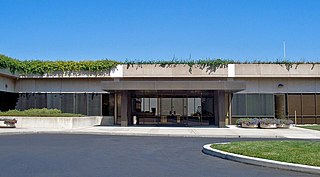Related Research Articles

Sir John Anthony Pople was a British theoretical chemist who was awarded the Nobel Prize in Chemistry with Walter Kohn in 1998 for his development of computational methods in quantum chemistry.

PARC is a research and development company in Palo Alto, California. Formed in 1969, the company was originally a division of Xerox, and was tasked with creating computer technology-related products and hardware systems.

The Indian Institute of Science (IISc) is a public, deemed, research university for higher education and research in science, engineering, design, and management. It is located in Bangalore, in the Indian state of Karnataka. The institute was established in 1909 with active support from Jamsetji Tata and thus is also locally known as the "Tata Institute". It was granted the deemed to be university status in 1958 and the Institute of Eminence status in 2018.

The Lawrence Berkeley National Laboratory (LBNL), commonly referred to as Berkeley Lab, is a United States national laboratory that conducts scientific research on behalf of the Department of Energy. Located in the hills of Berkeley, California, the lab overlooks the campus of the University of California, Berkeley.

The Cornell University Center for Advanced Computing (CAC), housed at Frank H. T. Rhodes Hall on the campus of Cornell University, is one of five original centers in the National Science Foundation's Supercomputer Centers Program. It was formerly called the Cornell Theory Center.

Argonne National Laboratory is a science and engineering research national laboratory operated by UChicago Argonne LLC for the United States Department of Energy. The facility is located in Lemont, Illinois, outside of Chicago, and is the largest national laboratory by size and scope in the Midwest.

The University of North Texas (UNT) is a public research university in Denton, Texas. Until 1988, it was known as North Texas State University. It consists of 14 colleges and schools, an early admissions math and science academy, Texas Academy of Mathematics and Science, for exceptional high-school-age students from across the state, and a library system that comprises the university core. The university is classified among "R1: Doctoral Universities – Very high research activity". According to the National Science Foundation, UNT spent $78.4 million on research and development in 2019.
The Jožef Stefan Institute (IJS) is the largest research institute in Slovenia. The main research areas are physics, chemistry, molecular biology, biotechnology, information technologies, reactor physics, energy and environment. At the beginning of the 2013 the institute had 962 employees, 404 of them were Ph.D scientists.

The University of Latvia is a state-run university located in Riga, Latvia established in 1919.

Forschungszentrum Jülich is a member of the Helmholtz Association of German Research Centres and is one of the largest interdisciplinary research centres in Europe. It was founded on 11 December 1956 by the state of North Rhine-Westphalia as a registered association, before it became "Kernforschungsanlage Jülich GmbH" or Nuclear Research Centre Jülich in 1967. In 1990, the name of the association was changed to "Forschungszentrum Jülich GmbH". It has close collaborations with RWTH Aachen in the form of Jülich-Aachen Research Alliance (JARA).

The Thomas J. Watson Research Center is the headquarters for IBM Research. The center comprises two sites, with its main laboratory in Yorktown Heights, New York, U.S., 38 miles (61 km) north of New York City and with offices in Cambridge, Massachusetts.

The Biocomplexity Institute of Virginia Tech is a research organization specializing in bioinformatics, computational biology, and systems biology. The Institute has more than 250 personnel, including over 50 tenured and research faculty. Research at the Institute involves collaboration in diverse disciplines such as mathematics, computer science, biology, plant pathology, biochemistry, systems biology, statistics, economics, synthetic biology and medicine. The institute develops -omic and bioinformatic tools and databases that can be applied to the study of human, animal and plant diseases as well as the discovery of new vaccine, drug and diagnostic targets.

Brno University of Technology is a university located in Brno, Czech Republic. Being founded in 1899 and initially offering a single course in civil engineering, it grew to become a major technical Czech university with over 24,000 students enrolled at 8 faculties and 2 university institutes.

The US National Center for Atmospheric Research is a US federally funded research and development center (FFRDC) managed by the nonprofit University Corporation for Atmospheric Research (UCAR) and funded by the National Science Foundation (NSF). NCAR has multiple facilities, including the I. M. Pei-designed Mesa Laboratory headquarters in Boulder, Colorado. Studies include meteorology, climate science, atmospheric chemistry, solar-terrestrial interactions, environmental and societal impacts.
The Pittsburgh Supercomputing Center (PSC) is a high performance computing and networking center founded in 2006 PSC is a joint effort of Carnegie Mellon University and the University of Pittsburgh together with Westinghouse Electric Company in Pittsburgh, Pennsylvania, United States. The center's Scientific Directors are Dr. Ralph Roskies of the University of Pittsburgh and Dr. Michael Levine of Carnegie Mellon University.

The College of Computing at the Georgia Institute of Technology has roots stretching back to an Information Science degree established in 1964. In 1988, Georgia Tech president John Patrick Crecine elevated the School of Information and Computer Science to become the College of Computing, making Georgia Tech the second university to do so, after Carnegie Mellon University created their School of Computer Science.
The Office of Science is a component of the United States Department of Energy (DOE). The Office of Science is the lead federal agency supporting fundamental scientific research for energy and the Nation’s largest supporter of basic research in the physical sciences. The Office of Science portfolio has two principal thrusts: direct support of scientific research and direct support of the development, construction, and operation of unique, open-access scientific user facilities that are made available for use by external researchers.
Angela K. Wilson is an American physical, theoretical, and computational chemist. She is currently the John A. Hannah Distinguished Professor of Chemistry in the department of chemistry of Michigan State University. At Michigan State University, she also serves as the Associate Dean for Strategic Initiatives in the College of Natural Sciences, and as Director of the MSU Center for Quantum Computing, Science, and Engineering (MSU-Q), a newly formed center at MSU, stemming from MSU's long history in quantum computing research.

Prem Chand Pandey is an Indian scientist and academic in the fields of Satellite Oceanography, Remote Sensing, Atmospheric Science, Antarctic and Climate Change

George Quentin Daley is the Dean of the Faculty of Medicine, Caroline Shields Walker Professor of Medicine, and Professor of Biological Chemistry and Molecular Pharmacology at Harvard Medical School. He was formerly the Robert A. Stranahan Professor of Pediatrics at Harvard Medical School, Director of the Stem Cell Transplantation Program at Boston Children's Hospital, and an investigator of the Howard Hughes Medical Institute, Associate Director of Children’s Stem Cell Program, a member of the Executive Committee of the Harvard Stem Cell Institute. He is a past president of the International Society for Stem Cell Research (2007–2008).
References
- ↑ Matsunaga, Nikita; Cundari, Thomas R.; Schmidt, Michael W.; Gordon, Mark S. (1992). "A comparative study of the bonding in heteroatom analogues of benzene". Theoretica Chimica Acta. 83 (1–2): 57–68. doi:10.1007/BF01113243. S2CID 93269697. Footnote on his name is a joke reference to Clambake.
- ↑ Cundari page Archived 2002-09-19 at Archive.today
- ↑ Research page Archived 2012-07-30 at Archive.today
- ↑ "The Center for Advanced Scientific Computing and Modeling".
- ↑ DOE Page about it Archived 2009-07-26 at the Wayback Machine
- ↑ Awards Archived 2009-07-31 at the Wayback Machine